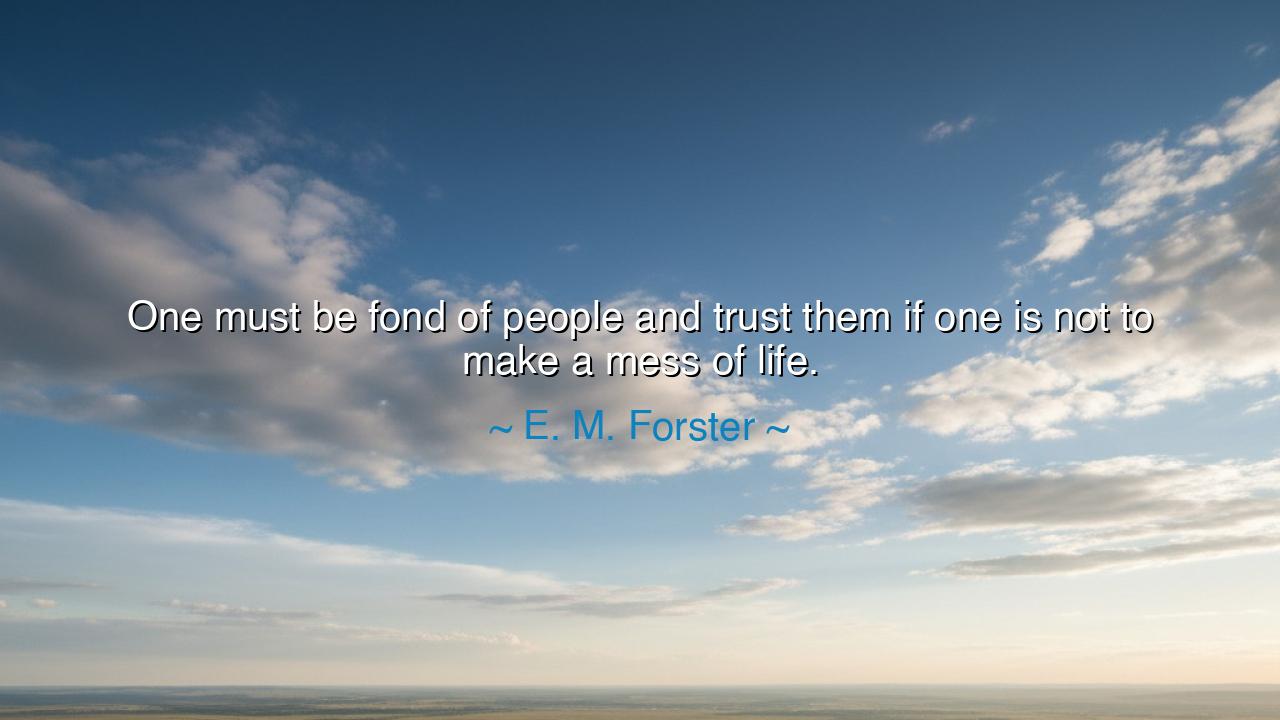
One must be fond of people and trust them if one is not to make






Hear the words of E. M. Forster, seer of human hearts, who declared: “One must be fond of people and trust them if one is not to make a mess of life.” At first, these words may seem gentle, even simple, like the counsel of a kindly elder. But within them lies a mighty truth: that no man or woman is an island, and that the weaving of human life is done not with isolation but with bonds of affection and trust. Without these, life becomes fractured, barren, and tangled—a mess of suspicion and loneliness.
The ancients taught this in many ways. The Greeks spoke of philia, the love of friendship, which was considered one of the pillars of a flourishing life. The Chinese sages taught of harmony between neighbors and the duty of trust within families. To be fond of people is not to ignore their faults, but to cultivate goodwill toward them despite their failings. Forster’s words remind us that if we approach life with bitterness, suspicion, and disdain, we will build walls so high that even joy cannot climb over them.
History itself proves this truth. Think of Abraham Lincoln in the time of America’s civil war. Surrounded by rivals, critics, and skeptics, he chose not to scorn them but to embrace them. His famous “team of rivals” cabinet was made up of those who had opposed him fiercely. Yet Lincoln, being fond of people and willing to trust them with responsibility, created a government stronger than any one man. Had he shut them out, his leadership would have faltered. His ability to value people, even when they did not always value him, kept the Union alive.
Forster’s teaching also warns us of the consequences of distrust. A life built on suspicion, fear, or contempt for others is a life closed off. Consider the tyrants of history—Stalin, Robespierre, or Nero. Their lack of trust poisoned every bond, turning allies into enemies, friends into traitors. They made a mess not only of their own lives, but of entire nations. Distrust corrodes the spirit until one is surrounded only by shadows. Thus, Forster reminds us that to build a true life, one must have the courage to believe in the goodness of others, even at the risk of being deceived.
But let it be remembered: to trust others is not blind foolishness. It is an act of strength, born of the conviction that life is richer when shared. To be fond of people means to look first for their light rather than their darkness, to see in them the same frailty and yearning that lives in us. This is not naïve, but noble. For it acknowledges that though betrayal may come, the reward of companionship and love outweighs the risk.
The lesson, then, is that life cannot be lived well in solitude or in suspicion. If you would walk the earth with joy, you must open your heart to others. Seek their company, delight in their presence, forgive their failings, and trust them enough to share your journey. Without this, even wealth, power, or knowledge will leave you empty, for the soul hungers for connection more than for conquest.
So, children of tomorrow, take this wisdom as a lamp for your path: Be fond of people. Learn to laugh with them, weep with them, and walk beside them. Place your trust not only in those who prove themselves flawless, but in the very fabric of humanity itself. And though some may fail you, many will return your trust with love. In this way, you will not make a mess of your life, but will weave it into a tapestry of friendship, joy, and meaning. This is the way of Forster, and the way of every heart that longs for wholeness.






AAdministratorAdministrator
Welcome, honored guests. Please leave a comment, we will respond soon